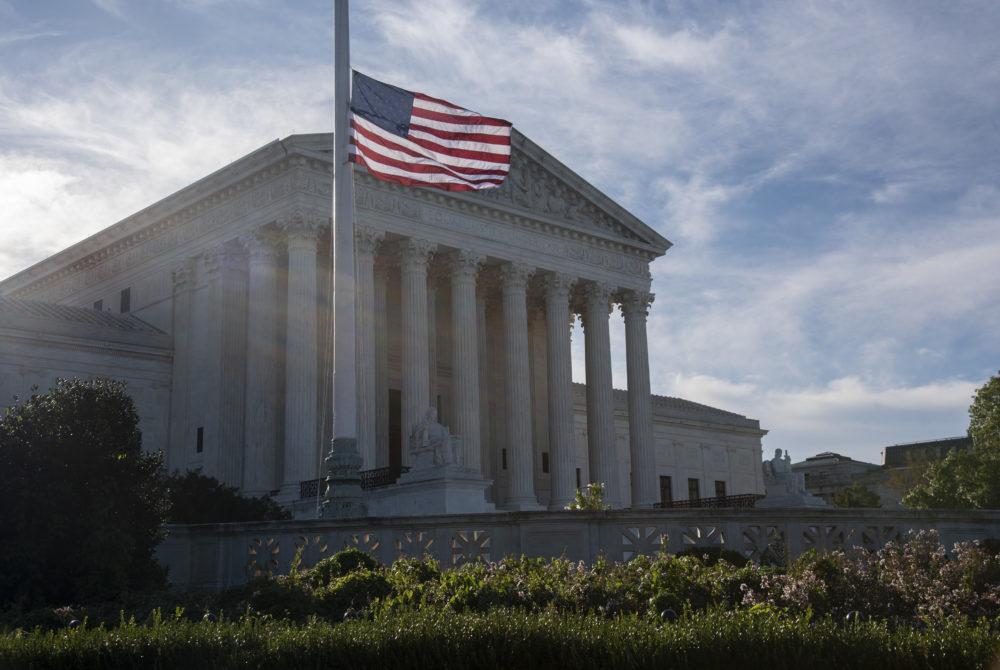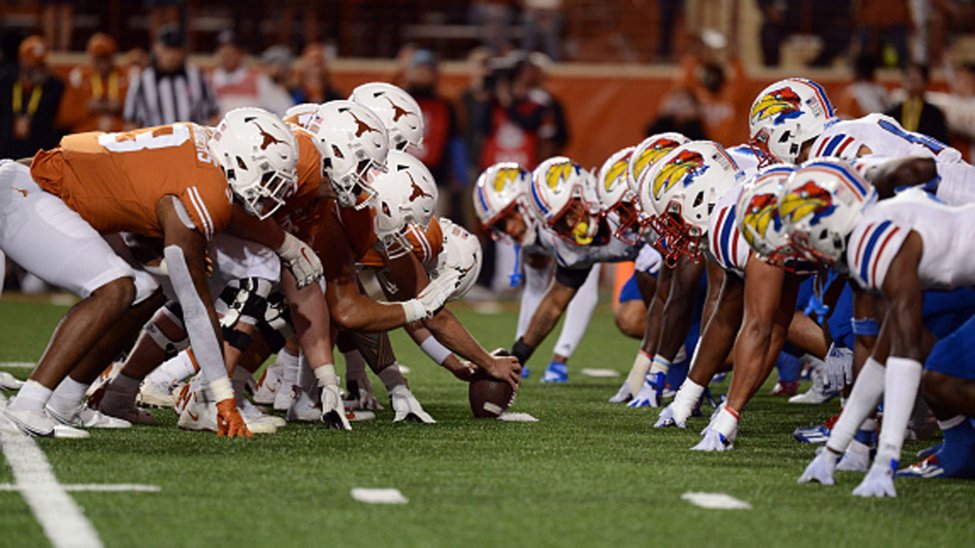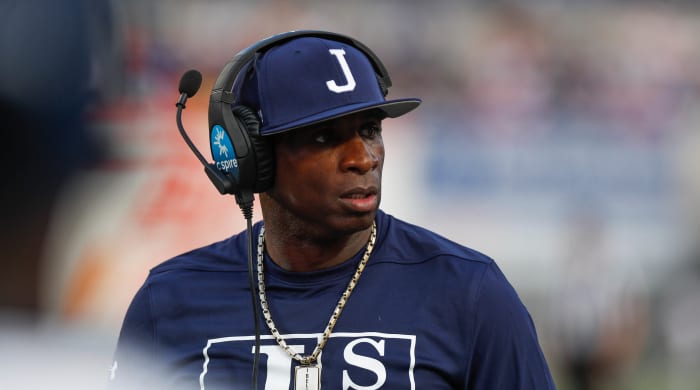New Florida Bill Would Allow Schools to Facilitate NIL Deals
The bill, which was filed hours after Florida State lost its top recruit to Jackson State, would strike language that prohibited schools from “causing compensation to be directed” to athletes.
By
Ross Dellenger | Dec 15, 2021
Jackson State pulled off one of the biggest recruiting coups in college football history on Wednesday under Deion Sanders.
Chip LaMarca wants to clear the air once and for all.
LaMarca, the 53-year-old Florida state representative, filed a new bill Wednesday to amend the state’s name, image and likeness law making it easier for the Sunshine State’s schools to facilitate NIL deals for their athletes. But it did not come as a response, he says, to Florida State losing a high-profile recruit to Jackson State in one of the biggest stunners in the history of national signing day.
The timing was just coincidental. He’s been working on the new bill for nearly six months.
“I didn’t even realize it was national signing day,” LaMarca told
SI in an interview on Wednesday night. “I saw the FSU stuff and thought, ‘Well this isn’t an FSU bill,’ but this is interesting!”
Jackson State, the historically black college in Jackson, Mississippi coached by former Florida State star Deion Sanders, made the biggest splash during Wednesday’s signing day. Sanders
flipped Rivals’ No. 1-ranked recruit in the nation, cornerback Travis Hunter of Georgia, a move that sent shockwaves across America on the first signing period since college athletes
could earn compensation from their name, image and likeness.
The timing of LaMarca’s bill, filed mere hours after Hunter’s news, added extra drama to an already splashy situation. But the genesis behind the new bill is much larger in scale, says LaMarca.
Players, coaches and administrators from Florida’s state universities have for months encouraged him and other legislators to amend portions of the state’s NIL law that puts them at a disadvantage when recruiting against other schools located in states with either no state law or a less restrictive state law.
LaMarca finally obliged. It just so happened to be filed on the biggest single recruiting day of the year and after the Seminoles experienced their stunning loss. In fact, LaMarca is asking himself what many are today: Why would the top-ranked prospect in the country choose Jackson State over FSU? He suggests that a future NIL deal may be in play for the 5-star defensive back, though he says he has no evidence to support that.
“What’s ironic, I’m both a Florida State and a Deion fan,” LaMarca said. “What is the reason to go from a program that was in the top-5 for 12 years straight with three national titles to a small HBCU in Mississippi?
“I’m assuming there is something in the works,” he continues. “There had to be some reason, or maybe he’s just a highly sought-after recruit and Deion is good at his job.”
Either way, NIL chatter ruled the opening day of the 72-hour early signing period. In fact, during news conferences and television spots on Wednesday, several coaches publicly revealed that NIL bidding wars for prospects are playing out across the country.
“I hope for these kids, they get all the money that they're being promised at all these schools when they get there,” Ole Miss coach Lane Kiffin told reporters.
“There were a lot of NIL deals going on before all this was going on,” Texas A&M coach Jimbo Fisher said during a spot on Paul Finebaum’s show. “They just weren’t legal. Nobody told nobody.”
LaMarca’s new bill to amend his state’s NIL law must pass Florida’s two legislative chambers and be signed by the governor. The bill is more evidence of the expected NIL war transpiring in college sports. Every school is trying to gain the advantage in this new era and their state is more than willing to help them do it. Florida was one of the leaders in this endeavor.
In June 2020, it became the second state to pass an NIL bill, following California. The bill’s effective date, July 1, 2021, set the earliest timeline and put the NCAA on what turned out to be a failed deadline to create an NIL policy. Dozens of states had
created NIL laws to give their schools an advantage over whatever policy the NCAA created. When the organization didn’t create a policy—mostly because of a
Supreme Court ruling that stripped its authority—suddenly those states with laws were at a disadvantage.
Thirty-five states have passed NIL laws, about 19 of which have become law. Schools residing in states without an NIL law only needed to follow a small set of guidelines the NCAA released. However, the association, so hamstrung with legal issues, has failed to police or enforce much of anything, creating what administrators term a “wild west.” NCAA president Mark Emmert did reveal last week that the organization has opened investigations into “a number” of NIL deals.
The NIL bidding war is playing out with transfers as well, says Todd Berry, the executive director of the American Football Coaches Association.
“Your whole football team is out there [in the portal] for whoever wants to pay the most money,” Berry says. “We knew this was going to be a problem. This is a complete mess.”
In all likelihood, states will follow Florida’s lead, adjusting language in their NIL laws to create advantages for their state schools. Florida’s amended bill, if passed, will allow schools more freedom to facilitate and discuss NIL deals with current athletes. The new bill strikes language in the original bill that prohibited schools from “causing compensation to be directed” to athletes.
“We had some real guardrails to keep folks in between the lines, but when the NCAA vacated NIL, it made other states more competitive than Florida,” LaMarca says. “We started hearing from athletes and lots of folks in the space ‘Look, we are at a disadvantage!’
“What it really came down to is an athlete couldn’t speak to the AD or coach about something. A lot of them, those are their mentors,” LaMarca continues. “If those coaches or ADs have something that comes to them or even if they want to reach out to their star athlete, they can’t even make that connection. If there’s something that is keeping a deal from happening we want to make sure that happens for them.”
This has impacted recruiting for his state’s schools, LaMarca says, even resulting in Florida athletes leaving the state for more lucrative NIL deals in other states.
Like the NCAA and others, LaMarca believes a federal bill is needed to govern NIL and bring equality to the landscape. However, he does not expect serious movement on that in Congress until after next year’s midterm elections.
In the meantime, the unequal NIL recruiting marches forward.
“Anything we do through the legislative process in creating parameters and guardrails is better than handing someone a bag of cash,” LaMarca says. “At least there is a legal, taxable and compliant bound solution for athletes to get what is rightfully there.”
https://www.si.com/college/2021/12/16/new-florida-nil-bill-schools-power





